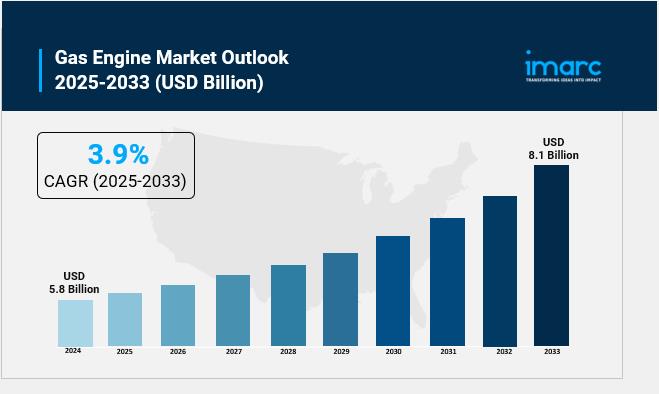Gas Engine Market Analysis: Strong Growth Projected At 3.9% CAGR Through 2033
The global gas engine market was valued at USD 5.8 billion in 2024 and is projected to reach USD 8.1 billion by 2033 , expanding at a CAGR of 3.9% between 2025 and 2033 . Growth is being propelled by the rising demand for uninterrupted and clean power supply, the increasing use of hybrid systems integrating gas engines with renewable energy, and the rapid expansion of the data center sector. Gas engines are emerging as a vital solution for sustainable and efficient power generation, aligned with global clean energy transitions.
Key Stats
-
Market Size 2024: USD 5.8 Billion
Market Size 2033: USD 8.1 Billion
CAGR (2025–2033): 3.9%
Leading Fuel Type (2025): Natural Gas
Key Regions: North America, Asia Pacific, Europe, Latin America, Middle East & Africa
Major Companies: Caterpillar Inc., Cummins Inc., General Electric Company, Mitsubishi Heavy Industries Ltd., Wärtsilä Oyj Abp, Siemens AG, Rolls Royce plc, and others
Growth Drivers
1. Rising Demand for Clean and Efficient Power Generation
The adoption of gas engines is accelerating as industries and utilities seek environmentally friendly power solutions. Natural gas and biogas-fueled engines emit fewer greenhouse gases than diesel or coal systems, supporting climate goals. Combined heat and power (CHP) applications are further enhancing demand due to their efficiency in generating both electricity and thermal energy.
2. Expansion of Industrial and Commercial Applications
Sectors such as manufacturing, food & beverages, oil & gas, and chemicals increasingly rely on gas engines for cost-effective and uninterrupted energy. In the commercial space, data centers, hospitals, and retail facilities adopt gas engines to ensure reliable power during grid instabilities.
3. Technological Advancements and Renewable Integration
Innovations such as lean-burn combustion, advanced turbocharging, and hybrid systems with solar and wind are boosting efficiency. Hydrogen-ready engines and upgraded biogas compatibility highlight the role of gas engines in the future of renewable energy integration.
AI or Technology Impact
Advancements in digital monitoring, smart grid integration, and AI-driven performance analytics are transforming the gas engine landscape. AI-powered predictive maintenance, fuel optimization, and remote monitoring reduce operational costs while ensuring higher efficiency and reliability.
Segmental Analysis
By Fuel Type
-
Natural Gas (largest share)
Special Gas
Others
By Power Output
-
0.5–1 MW
1–2 MW
2–5 MW
5–10 MW
10–20 MW
By Application
-
Mechanical Drive
Power Generation
Cogeneration
Others
By Industry Vertical
-
Utilities
Manufacturing
Oil & Gas
Mining
Others
Regional Insights
-
North America leads the global market due to strong natural gas infrastructure, policy support, and investments in CHP systems.
Asia Pacific is witnessing rapid adoption, led by China, India, and Japan, driven by industrial expansion and renewable energy integration.
Europe continues to emphasize sustainability, supporting biogas and hybrid engine deployments.
Latin America and Middle East & Africa show growing potential with rising urbanization and decentralized power demand.
Market Dynamics
-
Drivers: Rising clean energy demand, hybrid systems adoption, industrial applications, policy support
Restraints: Fluctuations in natural gas pricing, infrastructure costs in developing nations
Key Trends: Hydrogen-ready engines, renewable gas integration, AI-driven monitoring, decentralized energy systems
Leading Companies
-
Caterpillar Inc.
China Yuchai International Limited
Cummins Inc.
Doosan Corporation
General Electric Company
Hyundai Heavy Industries Co. Ltd.
JFE Holdings Inc.
Kawasaki Heavy Industries Ltd.
Mitsubishi Heavy Industries Ltd.
Rolls Royce plc
Siemens AG
Volkswagen AG
Wärtsilä Oyj Abp
Recent Developments
-
Wärtsilä introduced a fully hydrogen-capable engine platform in 2024, advancing toward net-zero goals.
Cummins and Shell collaborated on the X15N natural gas engine concept (Starship 3.0) with 15% reduced CO2 emissions.
Increased R&D investments in biogas and renewable natural gas (RNG) infrastructure.
Rising adoption of hybrid gas–renewable power systems for industrial and commercial sectors.
Ask Analyst for Customization: https://www.imarcgroup.com/request?type=report&id=5301&flag=C
If you require any specific information that is not covered currently within the scope of the report, we will provide the same as a part of the customization.
About Us:
IMARC Group is a global management consulting firm that helps the world's most ambitious changemakers to create a lasting impact. The company provides a comprehensive suite of market entry and expansion services. IMARC offerings include a thorough market assessment, feasibility studies, company incorporation assistance, factory setup support, regulatory approvals and licensing navigation, branding, marketing and sales strategies, competitive landscape, and benchmarking analyses, pricing and cost research, and procurement research.
Contact Us:
IMARC Group
134 N 4th St. Brooklyn, NY 11249, USA
Email:
Tel No: (+1-201971-6302 )
Legal Disclaimer:
MENAFN provides the
information “as is” without warranty of any kind. We do not accept
any responsibility or liability for the accuracy, content, images,
videos, licenses, completeness, legality, or reliability of the information
contained in this article. If you have any complaints or copyright
issues related to this article, kindly contact the provider above.
Most popular stories
Market Research

- The Dubai Insiders Club Expands Access To Australia And Asia Amid Surge In International Investor Demand
- From Zero To Crypto Hero In 25 Minutes: Changelly Introduces A Free Gamified Crash Course
- Lowkick Studio Launches $SHARDS Token On Top Tier Exchanges For Worldshards MMORPG
- TOKEN2049 Singapore Breaks Records: 25,000 Attendees At The World's Largest Web3 Event
- Red Lions Capital And Neovision Launch DIP.Market Following ADGM Regulatory Notification
- USDT0 And Xaut0 Are Now Live On Polygon






















Comments
No comment